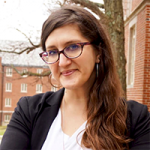 Professor Marlene Schwartz featured in news outlets for work on child hunger: CNN Surge in child hunger overwhelms richest US counties (read the article here), and Kaiser Health News Need Amid Plenty: Richest US Counties are Overwhelmed by Surge in Child Hunger (read the article here).
Professor Marlene Schwartz featured in news outlets for work on child hunger: CNN Surge in child hunger overwhelms richest US counties (read the article here), and Kaiser Health News Need Amid Plenty: Richest US Counties are Overwhelmed by Surge in Child Hunger (read the article here).
Author: Janice Berriault
Marlene Schwartz wins InCHIP Award
 Congratulations to Professor Marlene Schwartz, the 2021 winner of the InCHIP Community-Engaged Health Research Excellence Award!
Congratulations to Professor Marlene Schwartz, the 2021 winner of the InCHIP Community-Engaged Health Research Excellence Award!
Marlene Schwartz featured in Connecticut Health Investigative Team
 Professor Marlene Schwartz was featured in Connecticut Health Investigative Team, Dump the Juice Boxes: Milk, Formula, Water Are All Infants and Toddlers Need. Read the article here.
Professor Marlene Schwartz was featured in Connecticut Health Investigative Team, Dump the Juice Boxes: Milk, Formula, Water Are All Infants and Toddlers Need. Read the article here.
Rebecca Puhl featured in Beriatric News
 Professor Rebecca Puhl featured in Beriatric News, Weight Bullying Impacts Academic Performance. Read the article here.
Professor Rebecca Puhl featured in Beriatric News, Weight Bullying Impacts Academic Performance. Read the article here.
Breanna McFarlane and Maria Baratau featured in UConn Today
Two HDFS majors, Breanna McFarlane and Maria Baratau, featured in a story in UConn Today. Read the article here.
Alexandria Tomkunas selected to 2021 Southern Education Leadership Initiative cohort
 Congratulations to Graduate Student Alexandria Tomkunas who was selected to the 2021 Southern Education Leadership Initiative cohort. She will partake in an 8-week summer fellowship funded by the Southern Education Foundation and work for the organization “Voices for Georgia’s Children,” on a project analyzing the 181 Georgia school districts’ codes of conduct and discipline policies, in order to provide information to be reviewed in light of known policies and best practices for student outcomes and equity.
Congratulations to Graduate Student Alexandria Tomkunas who was selected to the 2021 Southern Education Leadership Initiative cohort. She will partake in an 8-week summer fellowship funded by the Southern Education Foundation and work for the organization “Voices for Georgia’s Children,” on a project analyzing the 181 Georgia school districts’ codes of conduct and discipline policies, in order to provide information to be reviewed in light of known policies and best practices for student outcomes and equity.
Abagail Horton receives NCFR honors student recognition
Congratulations to Graduate Student Abbey Horton, who received National Council on Family Relations (NCFR) honors student recognition for her master’s degree.
Alaina Brenick receives CLAS Faculty Mentoring Award
 Congratulations to Associate Professor Alaina Brenick, winner of the College of Liberal Arts and Sciences (CLAS) Faculty Mentoring Award for the mentoring of undergraduate students!
Congratulations to Associate Professor Alaina Brenick, winner of the College of Liberal Arts and Sciences (CLAS) Faculty Mentoring Award for the mentoring of undergraduate students!
Rachael Farina receives Summer Fellowship from UConn Graduate School
 Graduate Student Rachael Farina was a recipient for one of the Summer Fellowships for Advanced Graduate Students from the Graduate School at UConn.
Graduate Student Rachael Farina was a recipient for one of the Summer Fellowships for Advanced Graduate Students from the Graduate School at UConn.
Eleanor Fisk selected for SRCD Fellowship
 Graduate Student Eleanor Fisk was selected for the Society for Research on Child Development’s (SRCD) Pre-doctoral State Fellowship. Her 12-month placement at the Connecticut Office of Early Childhood will start in September. Caitlin Lombardi will serve as her faculty mentor.
Graduate Student Eleanor Fisk was selected for the Society for Research on Child Development’s (SRCD) Pre-doctoral State Fellowship. Her 12-month placement at the Connecticut Office of Early Childhood will start in September. Caitlin Lombardi will serve as her faculty mentor.